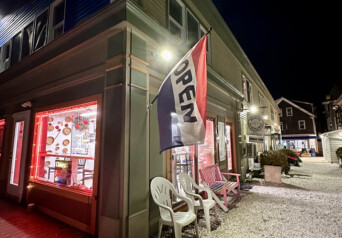Small Business Advocacy Honoring the Hardest Workers: Our Local Businesses
Local businesses are the backbone of our community, demonstrating remarkable resilience and a strong connection to their customers despite the challenges posed by corporate giants. These businesses thrive by offering superior customer service and fostering meaningful local relationships.

- Post Date
- Sat, Aug 31
- Small Business Advocacy
As we move past Labor Day, a time to honor the hardworking people who keep our economy running, it’s important to recognize some of the hardest workers among us—our local businesses. These businesses are the backbone of our community, consistently showing resilience and determination in the face of significant challenges. From navigating pandemics and economic downturns to battling the ever-growing pressures from corporate giants, running a small business is no small feat.
One shining example on Cape Cod is Hot Diggity, a local pet grocery and boutique with locations in Mashpee, Hyannis and Dennis Port, that will celebrate its 20th anniversary in October. In an era where online retailers like Amazon and Chewy dominate the market, Hot Diggity has not only survived but thrived, offering something that these corporate behemoths simply can't match: a genuine connection to the community. Ashley Lancaster, the owner of Hot Diggity, has demonstrated that success isn't just about selling products—it's about offering superior customer service, engaging with the community, and maintaining an unwavering love for her customers, especially the furry ones. Her journey - like so many of our beloved local businesses - is a testament to the grit, determination, and innovation required to keep a local business alive and well in today's world.
Local businesses like Hot Diggity have stayed in business for decades despite the uneven playing field, which Love Live Local has documented extensively. Corporate influence in the national economy has made it increasingly difficult for small businesses to compete. The dominance of corporations like Amazon, Walmart, Dollar General, Target, Anheuser-Busch, Visa, Mastercard, Bank of America, DoorDash, Comcast, Google and Meta, which prioritize profit over community impact, has imposed high costs and challenges on local businesses. These companies often exploit their scale to offer lower prices or more convenience, but at a cost that local businesses simply cannot match without sacrificing their values or sustainability.
Corporate giants create barriers for small businesses by driving up operational costs through high transaction fees or undercutting prices by leveraging their economies of scale. These practices force local businesses to make difficult choices—whether to absorb these extra costs, risking their already slim margins, or pass them onto consumers, which can be equally detrimental. On top of this, consumer behavior often prioritizes convenience and price over the impact of their purchases, leading people to choose big-box stores or online retailers without considering the long-term effects on their local economy.
Yet, despite these challenges, local businesses continue to innovate, make tough choices, and put in the hard work necessary not just to survive, but to succeed. Many have embraced new technologies to enhance customer experiences or have focused on offering unique and personalized services that big corporations simply can't replicate. Local businesses create meaningful connections with their customers, fostering a sense of community and belonging that goes far beyond transactional relationships. They are not just selling products or services; they are building relationships, supporting local causes, and contributing to the character and culture of Cape Cod.
This dedication to community and customer is what sets local businesses apart and why so many of them continue to endure, even in the face of overwhelming odds. It is a testament to the resilience and creativity of entrepreneurs like Ashley Lancaster and so many others, who refuse to be driven out by the pressures of corporate greed and instead find ways to thrive on their own terms.
The impact of choosing local cannot be overstated. Love Live Local’s research over the years has shown that local businesses of all kinds return 1.5 to 4 times the amount of money into the local economy compared to their big-box and online competitors. This means that every dollar spent locally is an investment in our community—supporting jobs, municipal services, causes, and the vibrancy that makes Cape Cod a unique place to live.
As we acknowledge one local business’ milestone, it’s also important to recognize the remarkable achievements of other local businesses that have stood the test of time. Consider J Miller Pictureframer & Gallery, which has been a cornerstone of creativity and craftsmanship for 25 years, or Hamco Flags, proudly serving our community for half a century. There’s the West Falmouth Market, a true testament to endurance and tradition, marking an incredible 125 years of continuous operation. Businesses like Hyannis Whale Watcher, Cape Cod Jewelers, and Seafood Sam’s have each navigated the changing tides for over four decades, while Ross Coppelman and the Bookstore Restaurant have each provided their unique offerings for 50 and 60 years, respectively. These are just a few of the dozens of Cape Cod businesses that have been serving customers and the community for multiple decades.
These businesses have weathered economic downturns, industry changes, and the rise of corporate competitors, yet they continue to thrive, providing not just products and services, but a sense of continuity and connection in our community. Every year they open their doors is a triumph over the challenges they face, and every dollar spent locally is a vote of confidence in their enduring presence.
So as you make your purchasing decisions, remember that where you choose to spend your money truly matters. Let’s continue to support the businesses that make our community special, ensuring they remain a vital part of our local economy for years to come.
Related articles
- Post Date
- Wed, Aug 21
- Small Business Advocacy
- Post Date
- Thu, Jun 20
- Small Business Advocacy
